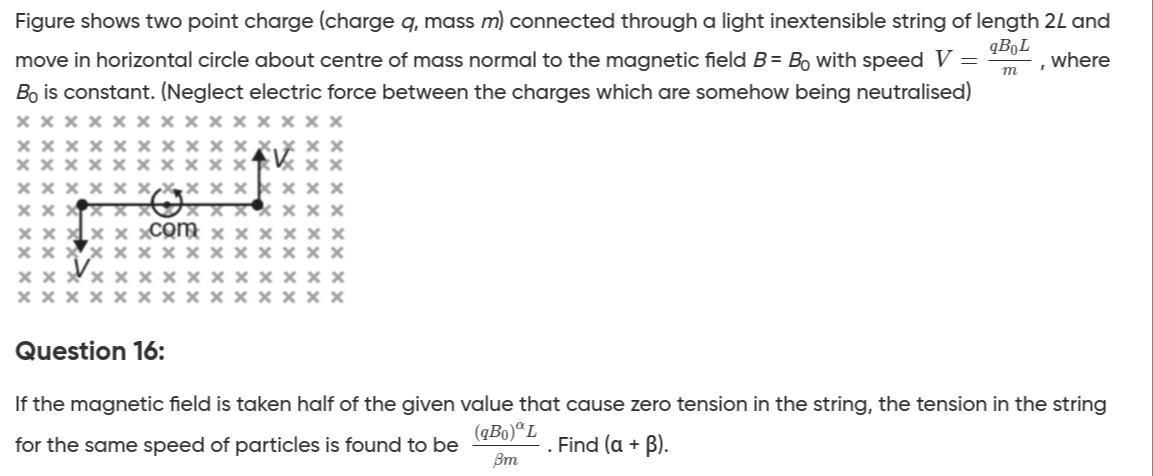Question
Question: Figure shows two point charge (charge $q$, mass $m$) connected through a light inextensible string o...
Figure shows two point charge (charge q, mass m) connected through a light inextensible string of length 2L and move in horizontal circle about centre of mass normal to the magnetic field B=B0 with speed V=mqB0L, where B0 is constant. (Neglect electric force between the charges which are somehow being neutralised)
If the magnetic field is taken half of the given value that cause zero tension in the string, the tension in the string for the same speed of particles is found to be βm(qB0)αL. Find (α+β).

4
Solution
The problem describes two point charges, each with charge q and mass m, connected by a light inextensible string of length 2L. They rotate in a horizontal circle about their center of mass (COM) in a uniform magnetic field B=B0, which is perpendicular to the plane of motion. The speed of each particle is given as V=mqB0L. We are told to neglect the electric force between the charges.
-
Motion Analysis: Since the charges are identical and the string has length 2L, the center of mass is at the midpoint of the string. Each charge moves in a circle of radius R=L about the COM.
-
Forces on a single charge: For each charge, there are two forces acting in the radial direction:
- Tension (T): Always directed towards the center of the circular path (i.e., towards the COM).
- Magnetic Force (FB): Given by FB=q(V×B). The magnitude is qVB since V and B are perpendicular.
To determine the direction of FB:
- Let's consider the charge on the right. Its velocity V is upwards. The magnetic field B is into the page.
- If q is positive, V×B points to the right, which is radially outwards from the COM.
- If q is negative, V×B points to the right, but since q is negative, FB points to the left, which is radially inwards towards the COM.
The problem states that the initial magnetic field B0 causes zero tension in the string. For tension to be zero, the magnetic force must be directed inwards, providing the necessary centripetal force. If FB were outwards, tension would have to be T=RmV2+FB, which could never be zero. Therefore, the magnetic force FB must be directed radially inwards. This implies that the charge q must be negative (assuming B is into the page and the rotation is as shown). In the calculations, we will use q as the magnitude of the charge in qVB.
-
Equation of Motion (Centripetal Force): Taking the radially inward direction as positive, the net force providing the centripetal acceleration RmV2 is: T+FB=RmV2 Substituting FB=qVB and R=L: T+qVB=LmV2 So, the tension in the string is T=LmV2−qVB.
-
Initial Condition (Zero Tension): When the magnetic field is B=B0, the tension T=0. The speed is V=mqB0L. Substituting these into the tension equation: 0=LmV2−qVB0 LmV2=qVB0 V=mqB0L This confirms that the given speed is consistent with the zero tension condition when the magnetic force is directed inwards.
-
New Condition: The magnetic field is now taken as half of the given value: B′=2B0. The speed of the particles remains the same: V=mqB0L. We need to find the new tension T′.
-
Calculate New Tension T′: Using the tension equation with B′: T′=LmV2−qVB′ Substitute V=mqB0L and B′=2B0: T′=Lm(mqB0L)2−q(mqB0L)(2B0) T′=Lm(m2q2B02L2)−2mq2B02L T′=mq2B02L−2mq2B02L T′=(1−21)mq2B02L T′=21mq2B02L T′=2m(qB0)2L
-
Compare and Find α+β: The calculated tension is T′=2m(qB0)2L. The given format for tension is βm(qB0)αL. Comparing these two expressions: α=2 β=2
Therefore, α+β=2+2=4.
Explanation of the solution:
- Identify the radius of circular motion for each charge as L.
- Recognize that for zero tension to be possible, the magnetic force must be directed radially inwards, contributing to the centripetal force.
- Write the centripetal force equation for one charge: T+qVB=LmV2, where T is tension, qVB is magnetic force, m is mass, V is speed, and L is radius.
- From the initial condition (T=0 when B=B0), the equation becomes qVB0=LmV2, which simplifies to V=mqB0L. This matches the given speed.
- For the new condition, the magnetic field is B′=2B0, and the speed remains V.
- Substitute B′ and V into the tension equation: T′=Lm(mqB0L)2−q(mqB0L)(2B0).
- Simplify the expression to find T′=2m(qB0)2L.
- Compare this with the given format βm(qB0)αL to identify α=2 and β=2.
- Calculate α+β=2+2=4.
